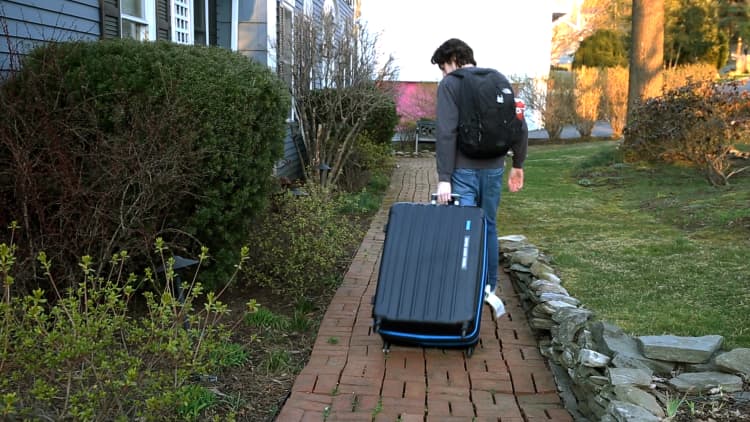American teens are worried about the financial impact of the coronavirus pandemic on their family — and on their future.
According to a survey by Junior Achievement and Citizens Bank, 57% of teenagers said they were concerned about how Covid-19 will affect their life after high school.
Of the high school juniors and seniors polled, 27% said their plans after graduation have changed and 44% said the pandemic has affected their plans to pay for college.
Additionally, 58% of the juniors and seniors polled said they were more likely to take out a student loan to pay for college. The survey of 1,000 U.S. teens ages 13 to 18 who are not currently enrolled in college was conducted April 8-14 by Wakefield Research.
"The immediacy of the crisis is causing a lot of college-bound teens to look hard at their options," said Jack E. Kosakowski, president and CEO of Junior Achievement USA, a nonprofit organization that helps prepare young people for success.
That may mean community college or a public school instead of a private one, or taking a gap year between high school and college. Prospective students may also be taking into account the fact that college campuses may still be closed in the fall.
Of those who said their plans after graduation changed, 35% said it would alter their living situation — like living at home instead of a dorm, and 30% delayed their college start date. Meanwhile, 13% changed the school they planned to attend and 8% decided to no longer attend college.
Yet in the end, a path forward, like attending a different school than expected, may still be a good one, said Dr. Wendy Sue Swanson, a pediatrician and former chief of digital innovation at Seattle Children's Hospital.
"If you want to be an architect or a school teacher or an entrepreneur, you are likely going to be that," even if you change schools or delay college, said Swanson, now chief medical officer at SpoonfulOne, a food allergy protection system.
Seniors who are experiencing financial difficultly and have already chosen their college for the fall should reach out to the school's financial aid office before making any moves.
Just be sure to be able to show how exactly the financial situation has been altered by the pandemic, said school counselor Brian Coleman, chair of the counseling department at William Jones College Prep High School in Chicago.
"Being stressed and anxious about paying for college is different than being in a situation of not being able to," he said. Coleman, along with "Shark Tank" investor Daymond John, former FDIC Chair Sheila Bair and financial psychologist Brad Klontz, addressed the issues in a Junior Achievement virtual town hall moderated by CNBC's Sharon Epperson, on Thursday.
In fact, the crisis may have an unintended consequence when it comes to understanding financial realities.
"Many high school graduates enter college without a clear idea of how they are going to pay for it," Kosakowski said, noting that it is one of the reasons for the $1.6 trillion student loan debt crisis.
"Ironically, teens planning to go to college in this environment might actually do better at managing their expenses because this crisis is forcing them to consider cost-cutting steps, like living at home while going to school or taking more courses online, which can be less expensive."
In addition to concern about their own future, teens are also worried about their family's immediate financial situation. When asked what aspects of Covid-19 they are concerned about, 36% said they were worried about their parents or guardians having enough money to pay the bills.
That's why it is important for parents to talk with their children about what's happening and walk through the different ways to address the situation.
"Money isn't an easy thing to talk about," Kosakowski said. "Our kids may be feeling anxiety and concerns that they aren't expressing to their parents or caregivers."
More from Invest in You:
Students among workers getting stiffed as many internships canceled
If you left or lost your job, here is what you can do with your 401(k)
Don't let your coronavirus anxiety cause you to make these money mistakes
Check in with your children about what they need and how they are feeling, and try to act with grace and patience toward everyone around you as you all navigate the emotions surrounding the crisis, added Coleman.
"Let [your children] know you are a resource, you are a support, but you may not have all the answers," he said.
Also, don't underestimate their maturity and their comprehension of what is going on, and don't discount the need for mourning these times, Swanson advised.
"It's OK to be really angry about it for time," she said.

Yet there may be some good news when this is all over.
While it "isn't pretty" right now, it could ultimately give children a sense of resilience, Swason noted.
Knowing that they can go through this challenge is an "incredible strength tool," she said.
"Once you get to the other side, a child knows and learns that they can actually endure something difficult," Swanson added.
"It will serve us for the rest of our lives."

SIGN UP: Money 101 is an 8-week learning course to financial freedom, delivered weekly to your inbox.
CHECK OUT: How to use your stimulus check to invest for the future via Grow with Acorns+CNBC.
Disclosure: NBCUniversal and Comcast Ventures are investors in Acorns. CNBC owns the exclusive off-network cable rights to ABC's "Shark Tank."






